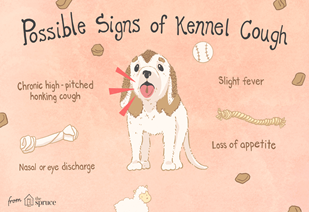Did you notice a stray dog on the street suffering from a hacking cough (a dry and frequent one) or showing a loss of appetite? Warning! The poor creature might be having Kennel cough!
Animals get Kennel Cough when they inhale bacteria or virus particles into their respiratory tract, resulting in the larynx (voice box) and trachea (windpipe) getting swollen. The most common bacteria that causes Kennel Cough is Bordetella Bronchiseptica. Studies have shown that the bacteria resemble the same one that causes whooping cough in humans.
In case a stray dog or pet has Kennel Cough or is showing symptoms of the same, the most sensible option would be to quarantine them and consult a vet. While the disease usually affects dogs, other animals such as mice, rabbits, cats, and horses can also develop it. This brings up the question- are we humans also susceptible to Kennel Cough?
Humans can also contract Kennel Cough from dogs, but it is rare. People with compromised immune systems, such as those who have lung cancer, are more likely to contract it.
How to determine if your pet has kennel cough?
- forceful, hacking (dry) cough, which will often sound like something is stuck in the throat, sneezing, loss of appetite, etc.
- A bacteria or virus.
- Avoiding exposure to places that are crowded and poorly ventilated, avoiding cold temperatures, exposure to dust, cigarette, smoke, etc.
- Home Treatment: Although most cases of Kennel Cough resolve within 3-4 weeks without treatment, medications such as certain antibiotics may speed recovery or minimize symptoms during infection. Sometimes Kennel Cough infection can lead to pneumonia, so be sure to meet a veterinarian if the health of the animal doesn't improve within the expected amount of time. Also, if there are symptoms of rapid breathing, loss of appetite, or laziness, contact your vet, as these could be signs of more serious conditions.

Preventive Measures to Avoid Kennel Cough
To avoid these and several other diseases one can ensure that:
- These animals regularly receive food and water along with warm blankets and pillows to avoid them sleeping on cold footpaths and roads.
- Keeping lukewarm water-filled bowls (Providing them with these facilities will make sure that they do not spend energy and time searching for food and water)
- Before starting vehicles, we should bang on the hood or make some noise with horns as many dogs and cats seek the warmth and shelter of our vehicles.
- We should also provide shelter to them by inviting them inside our garage and houses. We can also construct a shelter on our own or simply set up a tent.
These animals are already ignored and not taken care of by society and the government. We have to proactively find ways in which we can help them live not only a comfortable and fair life but also reduce their continuous struggles.
This is much more needed in recent times when the world is already dealing with a global pandemic along with harsh weather conditions.

Author: Anshul Raj
Anshul Raj is an Economics student at Delhi University trying to make a social impact. He appreciates activities in natural settings and is a fervent believer in animal welfare and environmental conservation.